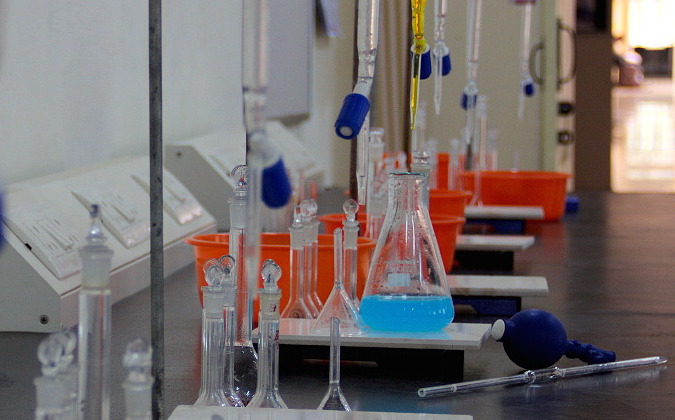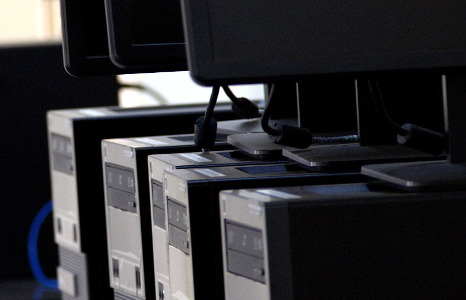Central Labs
The academic building houses class rooms, a seminar hall, a board room, an auditorium, library, Physics, Chemistry and Electronics labs, Computer lab, Cafeteria and faculty offices. For the curious and the tinkerer, this building also houses a dedicated innovation lab. All class rooms and seminar halls are video enabled and connected through National Knowledge Network. The building is wheel chair friendly.
The Campus, including the Academic building and Hostels, is fully Wi-Fi enabled with mobility in Internet Access. Various functional units of the institute are organized into 3 separate VLANS for secure connectivity. A 1000 Mbps Internet connection from the National Knowledge Network and another 100 Mbps connection from BSNL are made available in order to meet the Internet usage requirements.
Applied Mechanics Laboratory

The Applied Mechanics Laboratory houses state of the art tabletop experimental facilities in the broad areas of Strength of Materials and Fluid Mechanics. On the Strength of Materials part there are facilities to study deflection of beams, torsion and buckling. Strain gauge demonstration and a versatile photo elastic set up for demonstrating the stress patters in loaded transparent models are also available. A Universal Testing Machine of loading capacity up to 5.0kN is another noteworthy facility. On the Fluid Mechanics part, there are impressive tabletop facilities for demonstrating fundamentals of Fluid Mechanics. Versatile and easy to use, setups for pressure gauge calibration, friction losses in pipes and fittings, demonstration of Bernoulli’s principle, visualization of forced vortices are the other available facilities
.
Chemistry Laboratory

The Chemistry Laboratory is a spacious and well-ventilated laboratory equipped with all necessary safety features and state of the art worktables. Some of the lab facilities include a fume hood, hot air oven, UV-VIS spectrophotometers, calorimeters, electronic balances, electrical conductivity meters, pH meters, apparatus for studying melting point of materials. In addition, it has a RO water plant, ice flake makers, refrigerator, ultrasonic agitators, orbital shakers, and electric Bunsen burners. The lab is run on a rigorous policy of minimal waste.
Computer Laboratory
 IIT Palakkad has a state-of-the art Computing Centre with 255 All-In-One Dual Boot Desktops, spread across four different labs, connected centrally to the File Server with LDAP authentication. All machines are Internet enabled via high-speed network. There are four high-end Servers for the computing. A firewall and Squid Proxy Server are used for access control. The labs are equipped with projectors. The Learning Management System, Moodle, has been utilized for course content management.
IIT Palakkad has a state-of-the art Computing Centre with 255 All-In-One Dual Boot Desktops, spread across four different labs, connected centrally to the File Server with LDAP authentication. All machines are Internet enabled via high-speed network. There are four high-end Servers for the computing. A firewall and Squid Proxy Server are used for access control. The labs are equipped with projectors. The Learning Management System, Moodle, has been utilized for course content management.
Electronics Laboratory
 The Electronics Technology Lab provides an integrated environment for students to understand the working of analog and digital circuits, microprocessors and microcontrollers, and the interplay between computational tools and electronics hardware. Each desk of this lab is equipped with state of the art digital storage oscilloscopes, arbitrary waveform generators, power supplies and various prototyping boards (such as Field Programmable Gate Arrays – FPGAs and Microcontrollers) and a powerful desktop PC. This lab has been used to run lab courses on Digital Electronics, Analog Electronics and Computer Aided Design.
The Electronics Technology Lab provides an integrated environment for students to understand the working of analog and digital circuits, microprocessors and microcontrollers, and the interplay between computational tools and electronics hardware. Each desk of this lab is equipped with state of the art digital storage oscilloscopes, arbitrary waveform generators, power supplies and various prototyping boards (such as Field Programmable Gate Arrays – FPGAs and Microcontrollers) and a powerful desktop PC. This lab has been used to run lab courses on Digital Electronics, Analog Electronics and Computer Aided Design.
Physics Laboratory

The aim of the physics laboratory is to reinforce the concepts students have learned while simultaneously acquiring the skills and developing the confidence to carryout experiments on their own. The experiments cover three major fields: Mechanics, Optics and Electricity and Magnetism. The laboratory has several sophisticated instruments such as, digital oscilloscopes, programmable function generators, green laser diode assemblies, true rms digital meters, digital balance, etc. These instruments serve as tools for precision measurements, while the emphasis is placed on experimentation.
Surveying laboratory

Surveying laboratory is equipped with an array of state-of-the-art as well as traditional surveying instruments. The surveying practical offers the students hands-on training on the use of a variety of surveying instruments and the measurement techniques that they learn in the theory course. The practical sessions include linear measurements using chain and tape, angular measurements and traversing using compass and theodolite, elevation measurement using traditional (dumpy level) and automatic levels and the plane tabling methods. In addition, the use of modern instruments such as total stations and GPS is demonstrated. The current list of major instruments includes: GPS, Total stations, Vernier theodolites, automatic levels, dumpy levels, prismatic compasses, sets of plane table accessories (drawing board, alidade, trough compass and plumbing fork) and sets of chain survey equipment (metric chain, tape, ranging rod, offset rod, optical square, cross-staff, arrow, peg, etc.).
Innovation Laboratory
 The Innovation Lab at IIT Palakkad has an aim of being a student run hobby lab that allows students to translate their ideas into prototypes and products. Such a facility holds immense potential in pushing forward the ‘Make-in-India’ initiative of the Govt. of India. The heart of the Innovation Lab at IIT Palakkad is a set of table top computer controlled machining systems: a dual-head 3D printer, a CNC router, a CNC milling machine and a CNC lathe, which will enable the precise fabrication of prototypes in plastic, wood and soft metals such as aluminum.
The Innovation Lab at IIT Palakkad has an aim of being a student run hobby lab that allows students to translate their ideas into prototypes and products. Such a facility holds immense potential in pushing forward the ‘Make-in-India’ initiative of the Govt. of India. The heart of the Innovation Lab at IIT Palakkad is a set of table top computer controlled machining systems: a dual-head 3D printer, a CNC router, a CNC milling machine and a CNC lathe, which will enable the precise fabrication of prototypes in plastic, wood and soft metals such as aluminum.
An electronics testing and fabrication setup with power supplies, signal generators and oscilloscopes has also been operational. Students have been organizing themselves into clubs in order to take full benefit of the Innovation Lab – the ‘Robotics Club’ is the first such student-run club. It is envisaged that the facility can be made available to students in schools and colleges around IIT Palakkad, thereby acting as a force multiplier in the quest to encourage grass-roots innovation. The aim is the Innovation Lab will eventually incubate companies and nurture entrepreneurs.
Softwares
Apart from the free/open source software, the following proprietary software are being used by the researchers at IIT Palakkad: Matlab, AutoCAD, Abqus, STAADPro, Cadence, Ansys, Vivado, arcGIS, Plaxis 2D, Plaxis 3D, Mathematica, GeoStudio, MiPower, Sentaurus TCAD, Labview, Turnitin, ARM/Keil, Urkund, Solid Works, Mentor Graphics, Fusion 360, Revit, VISSIM, VISUM, KEIL, Microsoft Visual Studio, Sap 2000, OpenSees, Ansys Additive, MSC Simufact

